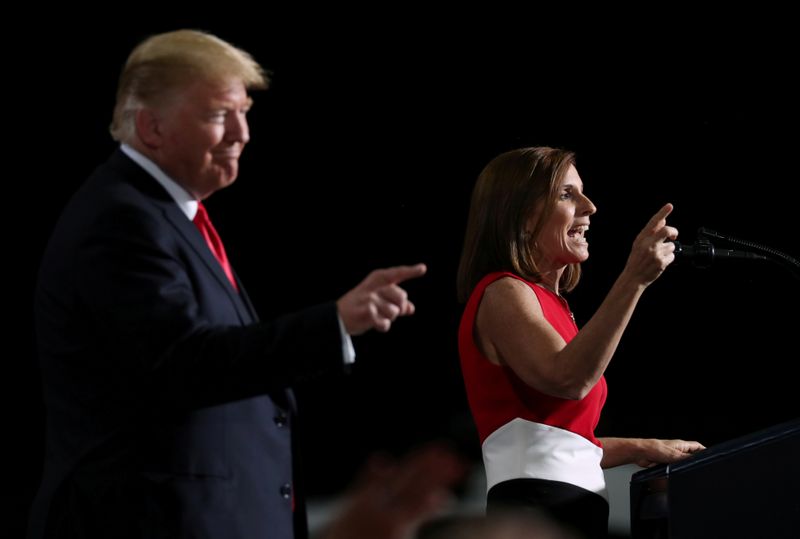By David Morgan
(Reuters) - U.S. Republican Senator Martha McSally shows every sign of being an imperiled incumbent, trailing Democratic challenger Mark Kelly in money and polling as President Donald Trump's electoral woes jeopardize Republican control of the Senate.
But some strategists and pollsters say the former Air Force combat pilot's best bet for retaining the Arizona seat once held by party giants John McCain and Barry Goldwater could be to cling to Trump and hope he can win the state again on Nov. 3, carrying her on his coattails.
Arizona has been drifting toward Democrats since Trump won the White House in 2016 and is among seven states where Senate Democratic challengers have taken the lead in fundraising and polls, threatening the chamber's Republican 53-47 majority.
All three main nonpartisan U.S. election handicappers now say the Arizona race tips in Democrats' favor after the Cook Political Report last week changed its rating from "toss-up." She is defending a seat she was appointed to after losing a 2018 run against Democratic U.S. Senator Kyrsten Sinema.
"McSally is the underdog because she lost the 2018 Senate race, and I would say that her opponent in the 2018 election was actually less formidable than Mark Kelly," Arizona State University political science professor Kim Fridkin said in an email.
Kelly, a former astronaut and Navy veteran, has been polling better than McSally for nearly a year, according to polling analysis website FiveThirtyEight.com. He commands strong backing among Democrats and Democratic-leaning independent voters.
McSally has been a top fundraiser among her Republican peers. But her $11 million in cash is less than half the size of Kelly's $24 million war chest.
Her job approval rating is lower than Trump's, which analysts attribute to votes in Congress against the Affordable Care Act.
"Support for Martha remains strong in Arizona because voters know the truth about her record. This is a close race," McSally campaign spokeswoman Caroline Anderegg said in a statement. "The enormous amount of money being spent by both parties is evidence enough that Arizona is very much a tossup."
THE MCSALLY CASE
Some Republicans think McSally can win if she and Trump can persuade enough Arizona conservatives that their ouster would leave Washington in the hands of a unified Democratic government with an agenda hostile to their interests.
"Everyone in my world thinks she's going to lose. But I don't," said Stan Barnes, a Republican strategist and former state legislator who believes a Trump victory would bring McSally enough support to put her over the top.
"I think it's going to be a close race, but the president wins Arizona, and those voters want the Senate to remain in Republican hands," he said.
A surge of coronavirus cases in the state is taking a toll on Trump's prospects, with some voters faulting his uneven pandemic response.
Kelly's campaign follows a similar style to the one Sinema used in 2018: light on party affiliation and more focused on Arizona's needs. He has used his national profile as a gun control advocate following the 2011 attempted assassination of his wife, former congresswoman Gabby Giffords, to establish a dedicated network of small campaign donors.
McSally has taken a more partisan, pro-Trump approach, warning voters that a Kelly victory would advance a "radical left" agenda. She has sought to portray Kelly as soft on China and alleges that Kelly and Biden represent a broken healthcare system that does not work for Arizonans.
"You do not want that agenda in our communities in Arizona and my opponent's first vote will be for (Senate Democratic leader) Chuck Schumer," McSally said in a July 13 online Team Trump interview with Trump daughter-in-law Lara Trump.
Her efforts to cater to Trump's supporters have had mixed success. Like many Republicans, McSally did not embrace Trump until after his stunning 2016 victory.
"I think she felt compelled, even having the appointment, to clothe herself in that populist Trump, hard-core right rhetoric. But I don't know that it's genuine," said Republican strategist Chuck Coughlin. "She's awkward at adopting that persona and they sense that about her."
Before her November matchup against Kelly, she faces an Aug. 4 primary challenge by businessman Daniel McCarthy, who some polls show as competitive.
Trump carried Arizona by 3.5 percentage points in 2016. The state's electorate has moved away from him since, with a growing Latino population and an influx of residents from more liberal locations.
But the state has voted for a Democratic presidential candidate only once since 1948, and Republicans predict the races will tighten in the fall.

"She can't afford to put any daylight between her and the president, because if anyone smells that, then all that drafting effect behind him gets wrecked," Barnes said.